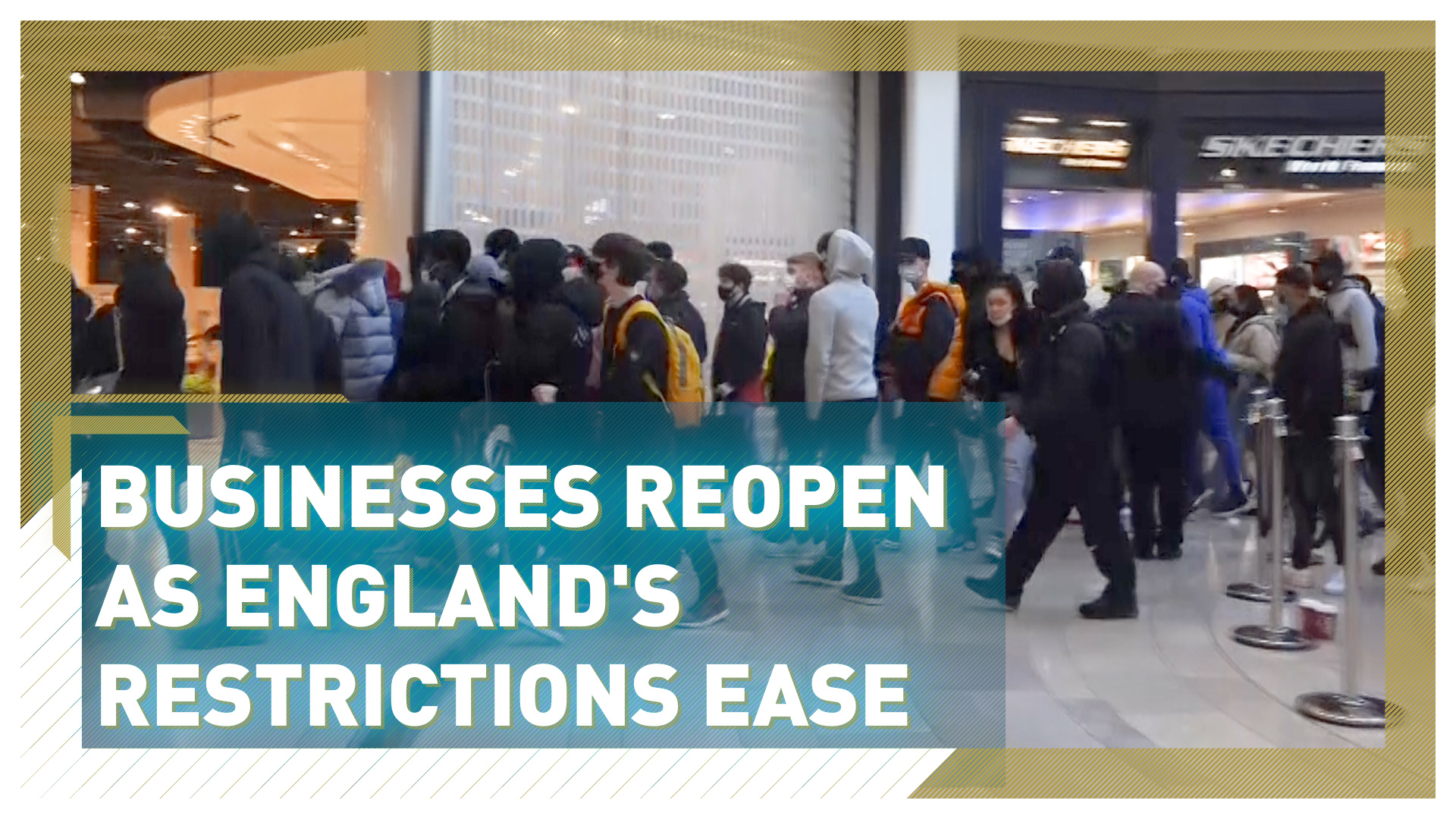
All restaurants in England ave been closed to diners since mid-December. /Iolo ap Dafydd/CGTN
All restaurants in England ave been closed to diners since mid-December. /Iolo ap Dafydd/CGTN
The number of customers who visited retailers surged by more than 146 percent in England on Monday as the opening of non-essential businesses was permitted for the first time since December.
The data from Springboard showed that smaller cities and towns recorded the largest week-on-week growth, while the capital London remained relatively quiet in comparison. The lack of commuters continues to be an issue for the UK's largest city, with only half as many shoppers on the high streets of London as there were in 2019.
Pubs and restaurants have reopened in England but only for drinking and eating outdoors. Indoor seating is not allowed until at least May 17.
READ MORE
Rare earth metals explained
The long road to restoring Notre-Dame
Greta Thunberg threatens to boycott COP26
02:05

It has been a long-awaited day for businesses and customers across the UK. People in Wales, Northern Ireland and Scotland have greater freedoms, too, with rules relaxed for socializing and people allowed to travel for domestic holidays.
Gyms and non-essential shops have also reopened in England and there have been reports of queues outside clothes shops at 7 a.m..
Hairdressers and barbers are among the businesses that are open now and they have found themselves fully booked. This is hardly surprising as many have had to endure months of lockdown hairstyles and DIY haircuts and are understandably keen for a professional touch.
It is a first for restaurants and pubs to serve customers exclusively at tables arranged outdoors.

It is a first for restaurants and pubs to serve customers exclusively at tables arranged outdoors. /Iolo ap Dafydd/CGTN
It is a first for restaurants and pubs to serve customers exclusively at tables arranged outdoors. /Iolo ap Dafydd/CGTN
All restaurants in England, such as Sam Harrison's in Hammersmith, West London, have been closed to diners since mid-December.
"It's probably taken about a month of preparation ... we've had the team back for a week, obviously we've been prepping in [the] kitchen, but we've been training all the staff again," he said.
"We haven't traded for four months, so you can't just turn that back on overnight," added the restaurateur.
Restaurant business have had to make a substantial financial commitment in the lead up to the reopening, including restocking the food essentials for the kitchen and the drinks for the bar.
"Right now it's all about cash flow, and we've made an enormous outlay to be ready," said Harrison. "All of the COVID-19 procedures [and] all of the requirements cost money, so we've got to be allowed to trade now and to continue to trade."

Diners could finally enjoy a meal cooked by professional chefs under the cover of heated gazebos. /Iolo ap Dafydd/CGTN
Diners could finally enjoy a meal cooked by professional chefs under the cover of heated gazebos. /Iolo ap Dafydd/CGTN
Unpredictable weather
In several regions, Britain's weather was predictably unpredictable.
There was rain, hail and snow showers, all before midday but the sun eventually did come out to mark the first day after lockdown.
On terraces, under the cover of heated gazebos, diners could finally enjoy a meal cooked by professional chefs rather than family members.
Louise Porter, the landlady of The Crown Inn in Askrigg, a small village in North Yorkshire, is hoping for sunny spring weather.
"We have a beer garden, we've got quite a few tables at the back. We can always get in more chairs [and] we've got a couple of awnings. We're hoping, praying for fine weather."
Back in London, market traders like Andy Graham in Covent Garden are unsure how their businesses will pick up in the absence of any foreign tourists.
"The market was absolutely desolate, the West End was desolate," said Graham.
"But we were especially quiet because we depend on tourists, both domestic and foreign, and obviously there were no foreign tourists. There's no museums to go to, no theaters to go to."

The virus is expected to spread as more people start to socialize again and there are concerns about how manageable any possible spikes will be. /Iolo ap Dafydd/CGTN
The virus is expected to spread as more people start to socialize again and there are concerns about how manageable any possible spikes will be. /Iolo ap Dafydd/CGTN
Pavement pragmatism
Down by the River Thames, where Harrison's restaurant is, he is hoping the outside tables will soon be busy and will help improve his restaurant's finances, but he can't wait for the dozens inside to be available for business as well.
"[With]100 seats inside and 32 seats outside, our overheads are the same and almost require the same number of staff," he explained.
"I think what we are most worried about is that there could be a delay to reopening inside on May 17, that's what we are all desperately waiting for."
The virus is expected to spread as more people start to socialize again, and there are concerns about how manageable any possible spikes will be.
Almost 40 million people across the UK have now received their first jab, but the question remains whether the more dangerous variants of the virus can be contained as people start to relax and enjoy themselves once more?
Harrison feels there has to be pavement pragmatism to boost social responsibility.
"There has to be a balance between the government, the operators and the customers," he urged. "We ask customers to respect the rules, to remember the rule of six, and to help us – we've really got to make this work together."
Video editor: Fernando Moreno and Riaz Jugon

